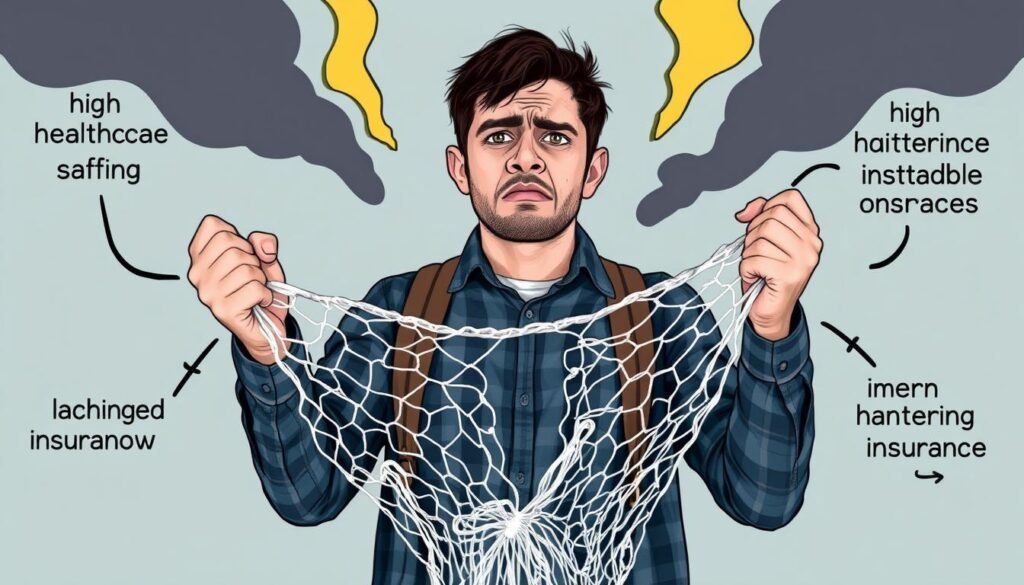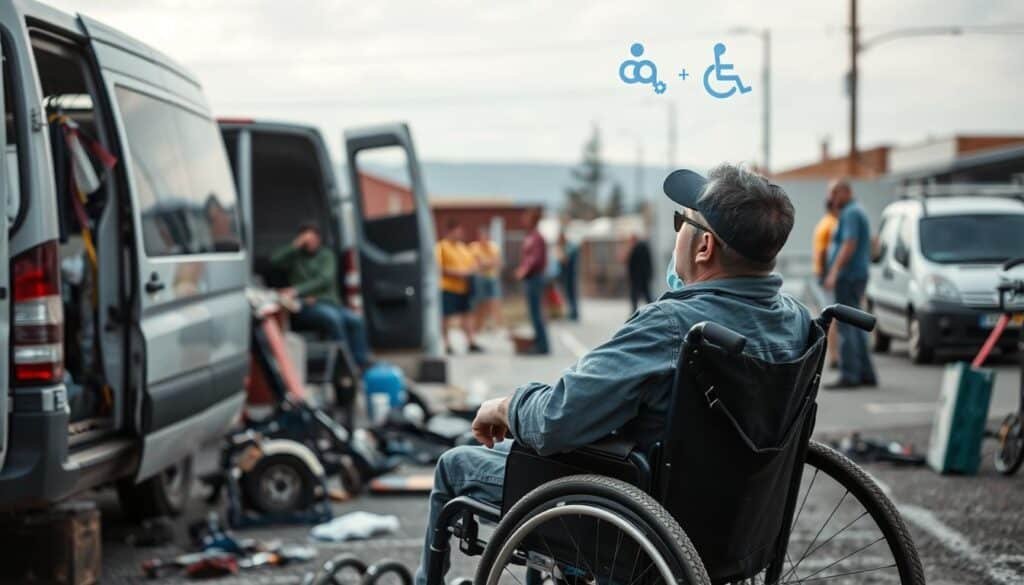Insurance And The Gig Economy: The gig economy is changing how we work, bringing in a new type of worker. These workers make a living from short-term jobs, freelance gigs, and on-demand services. They often don’t have the same job benefits as others, like health and disability insurance.
This article will look at the special insurance needs of the gig economy. We’ll cover the challenges, options, and trends for gig workers and their employers. It aims to help you make smart choices about insurance in the changing gig economy.
Key Takeaways
- The gig economy is a labor market with lots of short-term contracts and freelance work, not traditional full-time jobs.
- Gig workers usually don’t get the same benefits as regular employees, like health and disability insurance.
- It’s key for gig workers to plan their insurance to stay financially safe and ready for surprises.
- Knowing what insurance you need, like liability and auto insurance, helps you make good choices.
- The insurance industry is changing to help the gig economy. They’re offering more flexible and specific insurance products for this new workforce.
Introduction to the Gig Economy
The gig economy has become a big part of today’s job market. It offers a flexible way to work. People who work on their own, freelancers, and those who provide on-demand services love the freedom it gives them.
Definition and Characteristics
The gig economy is all about short-term jobs or freelance work, not long-term employment. Independent workers or freelancers are hired for specific tasks, not for a long time. This setup lets them control their work hours and balance work with life.
Growth and Prevalence
The gig economy has grown a lot lately, thanks to the sharing economy and more demand for on-demand services. The CIPD’s 2023 study found 40% of gig workers are in delivery or ride sharing. The other 60% includes various roles like data entry, writing, or design. While many enjoy the gig work lifestyle, there are worries about job security, uncertainty, and low pay for some gig workers.
Most people don’t work in the gig economy full-time. Only 53.2% of gig workers say it’s less than 25% of their income. This shows the gig economy is often seen as extra income, not the main job for many.
Insurance Challenges for Gig Workers

The rise of the gig economy has brought new challenges for insurance coverage for independent contractors and self-employed people. These workers often don’t get the employment benefits that traditional workers do. This leaves them at risk of financial insecurity.
Lack of Traditional Employment Benefits
Gig workers face a big issue because they don’t have benefits like health insurance and disability from employers. They must take charge of their insurance needs. This means they have to look into individual coverage options to protect their financial security.
Unique Risk Exposures
Gig work is unpredictable and comes with risks that regular employees don’t face. Workers in small business and self-employed fields need to be careful about liability issues. This includes general, professional, and product liability to protect against unexpected challenges.
“The gig economy has fundamentally changed the way we work, and it’s essential that we address the unique insurance needs of this growing segment of the workforce.”
The gig economy and insurance industry are meeting in a new way. They need to understand the lack of traditional benefits and unique risk exposures of gig workers. This will help create new solutions for the changing work-related needs of this new workforce.
Health Insurance and the Gig Economy

The gig economy is growing fast. This means more people need affordable health insurance. Luckily, there are many ways for freelancers and others in non-traditional jobs to get health coverage. Each option has its own benefits and things to think about.
Health Insurance Marketplaces
The health insurance marketplaces were set up by the Affordable Care Act (ACA). They offer many plans for individuals and small businesses, including gig workers. Here, people can look at different plans, see their costs, and maybe get help paying for coverage through tax credits.
Association Health Plans
Association Health Plans (AHPs) are another way for gig workers to get health insurance. Small businesses, freelancers, and professionals can join together by location or industry. This lets them get group health plans at lower prices than individual ones.
Health sharing ministries might be cheaper for some gig workers. But, it’s key to know these aren’t like regular health insurance. They might not cover as much.
Choosing health insurance is important for gig workers. They should think about their health needs, budget, and what coverage they want. This helps them pick the best plan for them.
“The health insurance marketplaces offer a valuable resource for gig workers to compare and secure the coverage they need, often with the added benefit of tax credits to help make it more affordable.”
Liability Coverage for Gig Workers
Gig workers in the on-demand economy need to think about liability coverage. They often deal with risks because they work directly with clients. Insurance can help protect them from financial losses due to accidents or mistakes.
General Liability Insurance
General liability insurance covers gig workers for many risks. It helps protect against claims of injury, damage to property, and personal and advertising harm. This policy can cover the costs of lawsuits and settlements, keeping gig workers safe from unexpected financial hits.
Professional Liability Insurance
For gig workers who offer advice or professional services, professional liability insurance is key. Known as Errors and Omissions (E&O) insurance, it protects against claims of mistakes or not meeting professional standards. This coverage is crucial for gig workers to avoid financial loss from such claims.
Product Liability Insurance
Gig workers who make, sell, or distribute products need product liability insurance. This insurance covers costs from injuries or damages caused by their products. It’s a must-have for gig workers in manufacturing or retail to manage risks well.
| Type of Liability Coverage | Description | Key Benefits |
|---|---|---|
| General Liability Insurance | Broad coverage against claims of bodily injury, property damage, and personal/advertising injury | Protects gig workers from the financial burden of lawsuits and settlements |
| Professional Liability Insurance | Also known as Errors and Omissions (E&O) insurance, protects against claims of negligence, mistakes, or failures in professional services | Safeguards gig workers providing advisory or professional services from financial consequences of claims |
| Product Liability Insurance | Covers claims related to product-related injuries or damages for gig workers who produce, distribute, or sell physical goods | Offers protection against the costs associated with product-related claims or lawsuits |
Liability coverage is very important for gig workers. They face special risks because they work closely with clients. Knowing about the different types of insurance and their benefits helps gig workers protect their businesses and themselves.
Disability Insurance for Gig Workers

The gig economy is growing fast, making it more important to have good insurance. Disability insurance is key for gig workers. It gives them a safety net if they get sick or hurt. This insurance helps keep their income safe and their financial health secure.
There are two main types of disability insurance for gig workers: short-term and long-term. Short-term disability insurance helps by covering part of the worker’s income for a few months. It’s great for minor injuries or illnesses that stop a worker from doing their job.
Long-term disability insurance takes over when short-term coverage ends. It can last for years or until retirement. This policy is crucial for serious conditions that make it hard or impossible to work.
It’s important for gig workers to know the details of disability insurance. Some policies pay out if a worker can’t do a certain job. Others pay if they can’t work at all. Reading the policy carefully ensures it meets the unique needs of gig workers.
| Coverage | Benefit Period | Typical Use Case |
|---|---|---|
| Short-Term Disability | 3-6 months | Minor injuries or illnesses that temporarily prevent a gig worker from performing their duties |
| Long-Term Disability | Several years or up to retirement | Serious, debilitating conditions that render a gig worker unable to pursue their profession for an extended period |
Getting disability insurance is a smart move for gig workers. It gives them financial security and peace of mind. This coverage is key to ensuring their freelance careers are successful and stable in the long run.
Auto Insurance for Gig Economy Workers

In today’s gig economy, more workers choose flexible on-demand services. This makes auto insurance more crucial. Gig workers often drive for jobs like food delivery, ridesharing, or transporting goods. This can mix personal and work driving, causing coverage gaps.
Personal Auto Insurance Limitations
Standard personal auto insurance covers personal driving. But, it might not cover work-related driving for gig workers. Insurers often have exclusions or limits, leaving gig workers at risk during work.
Commercial Auto Insurance
Commercial auto insurance is better for gig workers who use their cars for work. It covers damages and injuries from work driving. This insurance is a safety net for those using their cars for work.
Rideshare Endorsements
For gig workers in ridesharing, some insurers offer rideshare endorsements. These are special products that fill the gap between personal and ridesharing coverage. They ensure gig workers have the right coverage and protection while driving for ridesharing.
The gig economy is always changing. It’s important for gig workers to know about auto insurance. They should understand personal policy limits, commercial coverage, and rideshare endorsements. This knowledge helps them make smart choices and get the right protection for their needs.
Insurance and the Gig Economy: Employer Considerations

The gig economy is growing fast, and employers need to think carefully about insurance to protect their business and workers. It’s important for employers to take steps to reduce risks and build a strong relationship with gig workers.
Collaborative Health and Wellness Initiatives
Smart employers see the value in working together with gig workers on health and wellness. These efforts make the gig workforce healthier and more productive. They also show that employers care about their workers’ well-being.
By tackling health and safety issues together, employers can make gig workers happier, more loyal, and more satisfied with their jobs.
Clarifying Insurance Responsibilities
Employers must be clear about who is covered by insurance for work and personal activities. This helps protect both the worker and the employer. Clear policies and open communication let gig workers make smart choices about their insurance.
| Employer Considerations | Key Benefits |
|---|---|
| Collaborative Health and Wellness Initiatives |
|
| Clarifying Insurance Responsibilities |
|
By focusing on the insurance needs of gig workers, employers can lower risks, build a collaborative employer-worker relationship, and lead in the changing gig economy.
Navigating Gig Worker Insurance Needs

The gig economy is changing fast. It’s key for independent contractors and freelancers to look at their risks and future scenarios. This helps them make smart insurance choices. Doing risk audits often can spot weak spots and keep their insurance up to date as their work changes.
For gig workers, setting aside money for insurance is like any other business expense. Putting this money in their budget keeps their coverage steady and their finances ready. Some insurers let you pay less often, like every three or six months. This can help with money flow, but remember to think about any extra fees for paying this way.
Working with independent insurance agents is a big help for gig workers. These pros know about many insurance options and can find the best deals. They keep gig workers updated on new industry trends and changes in insurance that could help them.
“Seek professional guidance to navigate the complex insurance landscape and ensure you have the right coverage for your gig work.”
Regulatory Landscape and Emerging Trends

The rules around the gig economy are still changing, and gig workers might see more shifts soon. Recent court decisions and talks in the government have made things unclear. This is causing problems for both gig workers and insurers.
In the UK, a high court said gig workers are their own bosses, so companies don’t have to give them usual employment rights. But, this could be challenged again, and in the EU, there’s talk about giving gig workers employment rights.
This unsettled regulatory landscape means it’s hard to know what insurance products to make and sell. The insurance industry needs to stay adaptable and quick to change to help gig workers.
| Regulatory Developments | Implications |
|---|---|
| UK Supreme Court ruling on gig worker status | Companies not required to provide traditional employment benefits |
| EU debate on gig worker employment rights | Potential changes to gig worker insurance responsibilities |
As the regulatory landscape keeps changing and emerging trends come up, gig workers and insurers need to stay alert and ready to adapt. This will help them deal with the uncertainty ahead.
Insurance Industry Strategies
The insurance industry is changing to meet the needs of the gig economy. Insurers and price comparison sites are teaching gig workers about the coverages they need. For example, they tell drivers that regular motor insurance might not cover rideshare work.
By working with freelancer platforms, insurers can sell their policies directly to gig workers. This makes getting coverage easy for workers through the places they find jobs.
Insurers are now offering flexible insurance products that fit the gig economy’s needs. Options like pay-as-you-go or short-term coverage match the ups and downs of gig workers’ income. This makes insurance more accessible and adaptable for the gig economy.
“Insurers that can provide flexible and accessible insurance solutions for gig workers will be well-positioned to capitalize on the rapid expansion of this dynamic labor market.”
The insurance industry is showing it can change and support the gig workforce. It’s doing this by educating gig workers, partnering with gig platforms, and offering flexible insurance products.
Also Read : How Can I Apply For Term Life Insurance Online?
Conclusion
The gig economy has changed how we see work, giving people more freedom and flexibility. But, this freedom brings its own set of insurance challenges. Gig workers face issues with health, liability, disability, and auto insurance without the benefits of regular jobs.
To overcome these challenges, gig workers need to plan, stay informed, and use professional advice. This way, they can create a strong safety net for themselves. This allows them to follow their dreams with more financial security.
The gig economy is growing, and insurance companies must change to help this changing workforce. They need to work together with workers for everyone’s safety and success. This will make the gig economy even stronger.
Looking ahead, the gig economy looks bright, but we must plan for insurance carefully. By working with the insurance industry, gig workers can enjoy the benefits of the gig economy safely. We can make a future where the gig economy and insurance help each other, supporting this important part of the workforce.
FAQs
Q: What is gig work and how does it relate to the gig economy?
A: Gig work refers to short-term, task-based jobs that provide flexibility to workers, often facilitated by platforms like Uber, Lyft, TaskRabbit, and Upwork. The gig economy encompasses all such employment arrangements where independent contractors engage in temporary or freelance work.
Q: Do I need gig economy insurance if I work as an independent contractor?
A: Yes, gig economy insurance is essential for independent contractors as it provides coverage for the unique risks associated with gig jobs, such as accidents while working or potential liability claims. Many gig workers find that traditional insurance policies do not adequately cover their needs.
Q: What types of insurance covers are available for gig workers?
A: Insurance covers available for gig workers include accident insurance, disability coverage, and private insurance policies. These policies can help protect against the financial risks associated with gig work, including short-term and long-term disability insurance.
Q: How do platforms like Uber and Lyft provide insurance for gig workers?
A: Platforms like Uber and Lyft often offer limited insurance coverage for their drivers during the time they are actively engaged in ridesharing or delivery jobs. This coverage may include liability insurance but is often not comprehensive, making it crucial for drivers to consider additional private insurance options.
Q: What should I look for in a gig economy insurance policy?
A: When selecting a gig economy insurance policy, consider coverage options that address the specific risks associated with your gig job. Look for insurers that provide coverage for accidents, liability, and any group benefits that may be relevant to your work as an independent contractor.
Q: How can gig workers leverage insurance to protect themselves?
A: Gig workers can leverage insurance by choosing policies that address their unique risks. By embedding coverage for accidents and offering flexibility in policy terms, insurers can help protect gig workers from financial hardship due to unforeseen events related to their gig jobs.
Q: Are there any specific insurers that focus on gig economy insurance?
A: Yes, there are insurers that specifically provide gig economy insurance tailored for independent contractors. These insurers understand the set of risks faced by gig workers and offer policies that cater to their needs, making them a valuable resource in the insurance market.
Q: How do I navigate the application and enrollment processes for gig economy insurance?
A: Navigating the application and enrollment processes for gig economy insurance typically involves researching various insurers, comparing policy options, and completing necessary documentation. Many providers now offer online applications to streamline this process for gig workers.
Q: Is gig economy insurance expected to grow in the broader economy?
A: Yes, gig economy insurance is expected to grow as more individuals participate in the gig economy. With around 30 percent of the U.S. workforce engaging in gig work, the demand for tailored insurance policies that provide adequate coverage is likely to increase.
Source Links
- https://www.forbes.com/sites/truetamplin/2023/10/15/in-the-gig-economy-here-are-insurance-coverages-you-need-to-have/
- https://www.measureone.com/blog/everything-you-need-to-know-about-gig-worker-insurance
- https://www.confused.com/meet-our-experts/content/how-the-gig-economy-is-impacting-insurance






